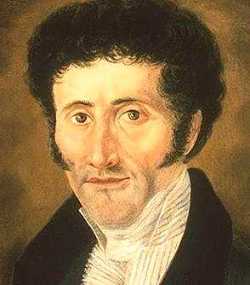
E.T.A. Hoffmann
(My complete GMD bio/commentary
is here).
Bibliography
E.T.A. Hoffmann, like Novalis, was one of the
earliest of the German Romantic authors. His most notable
works are The Golden Pot, The Devil's Elixirs,
The Sand-Man, and The Singer's
Contest, along with The Nutcracker and the Mouse King,
a short story which Tchaikovsky immortalized by adapting it
into his famous The Nutcracker ballet. His philosophy of the unconscious mind would
have more in common with Carl Jung than George MacDonald,
and indeed both Jung and Freud drew heavily from Hoffmann's
ideas. However, he still left his brand on MacDonald in
several ways, mostly concerning story devices. MacDonald
thought that Friedrich de la Motte Fouque's Undine was the greatest of all
fairytales. It
involved the story of a water nymph who desperately wanted
to be like normal women. Hoffmann would later collaborate
with Motte Fouque writing an opera based on the tale. The story has in it knights and
enchantments, the likes of which may have found their way
into Phantastes. But it was The Golden Pot
and The Devil's Elixirs that George MacDonald would
borrow most liberally from. It was in  the former that he
found the notion of creating adult fairytales where the
normal world and the world of fairy would interact with one
another, along with the notion of a person co-existing in
more than one world simultaneously. He would employ these concepts
in Phantastes, Lilith, and At the Back of
the North Wind among others.
the former that he
found the notion of creating adult fairytales where the
normal world and the world of fairy would interact with one
another, along with the notion of a person co-existing in
more than one world simultaneously. He would employ these concepts
in Phantastes, Lilith, and At the Back of
the North Wind among others.
The Devil's Elixirs tells the
story of a monk who goes insane and commits many terrible
deeds. He is aided in his villainy by a doppelganger he
meets in a prison cell. Throughout the story, the monk
often finds himself wondering if the double is a phantom of
his own mind or if it is in actuality some other being
which commits these crimes. It is plain however, that
Hoffmann means to present the doppelganger as a figment
from imagination rather than a spiritual being, and therein
lies the major difference between Hoffmann and MacDonald,
aside from the fact that most people would probably
consider MacDonald a much more stylish and inventive
writer. Hoffmann can also be said to make extensive use of
mirrors to work a magical effect in his stories. Mirrors
have always been a central feature of magical literature,
and of course seers from the world over have used mirror
gazing to see into other realities and times at least as
far back as Plato's day. MacDonald also made use of mirrors
in similar ways, but whether he got the idea from Hoffmann
or not is highly debatable.
One last thing Hoffmann may be noted for is one of, if not the earliest, incidents of a character using a demonic being to aid in his own mastery of musical abilities. This occurred in the story called The Singer's Contest. It may have been the catalyst for the many tales that have sprung up in our own times of a musician going "down to the crossroads" to sell his soul to the Devil in order to become a famous musician.